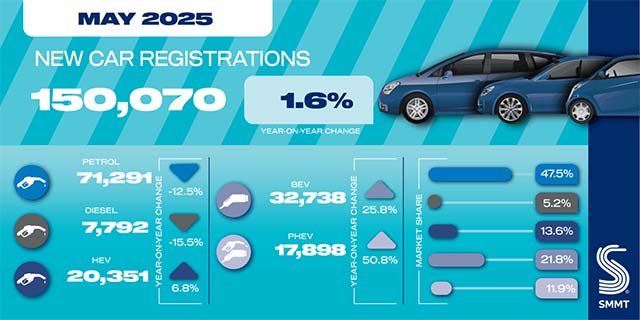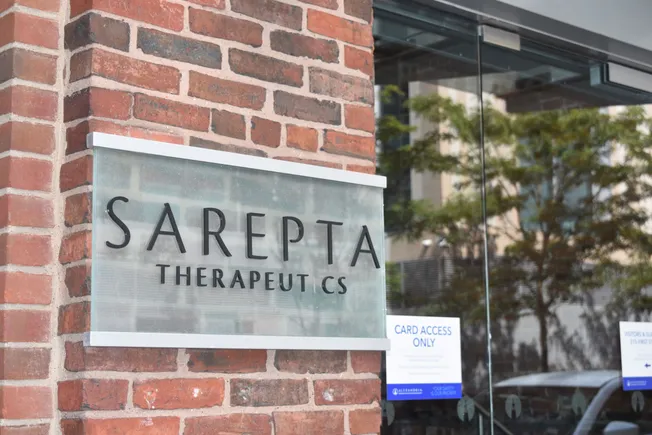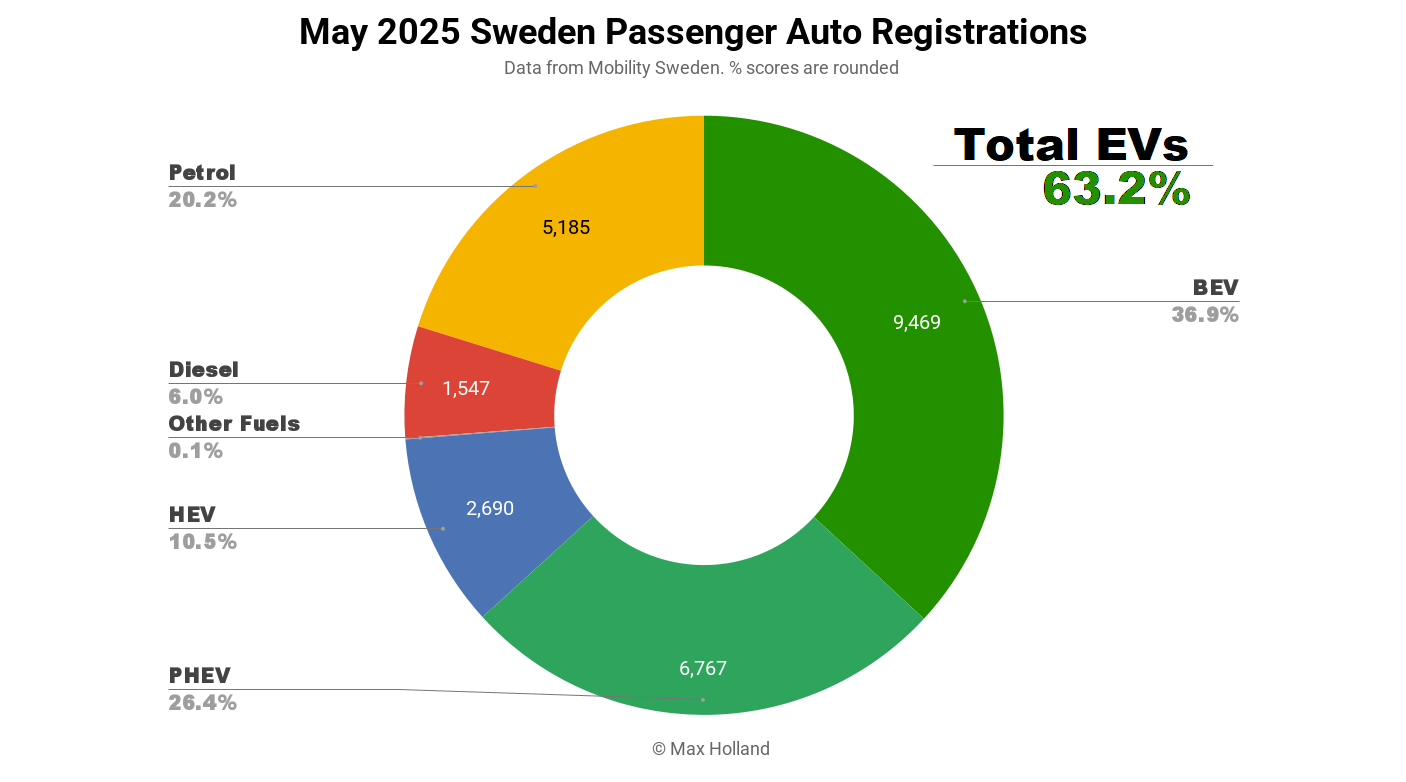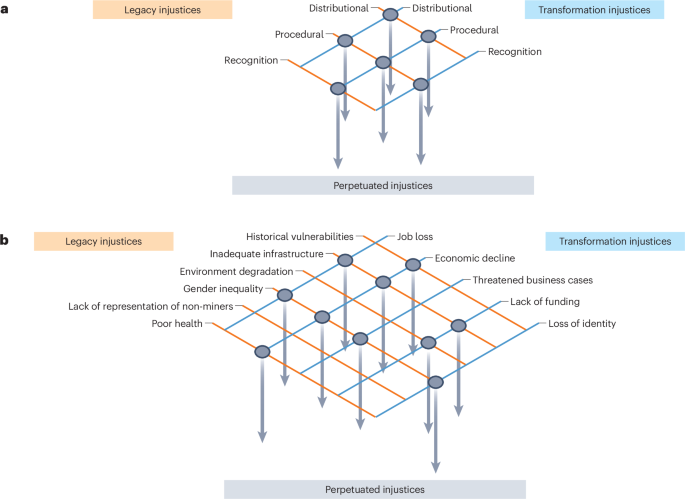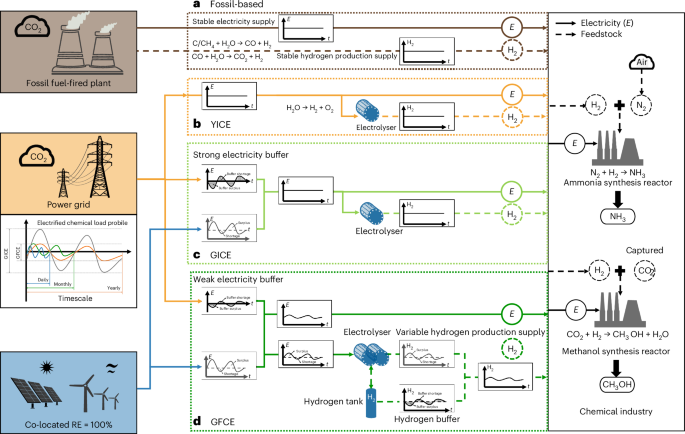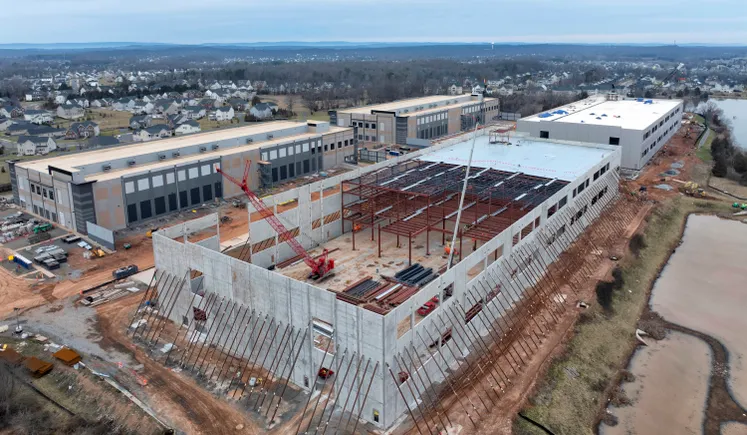Legal Ethics Roundup: Ford Sues Lawyer Billing 57-Hour Day, ‘Biglaw 3, Trump 0,’ ABA & Fed Soc Out on Judges & More
Your tour of all things related to lawyer and judicial ethics, with University of Houston law professor Renee Knake Jefferson. The post Legal Ethics Roundup: Ford Sues Lawyer Billing 57-Hour Day, ‘Biglaw 3, Trump 0,’ ABA & Fed Soc Out on Judges & More appeared first on Above the Law.
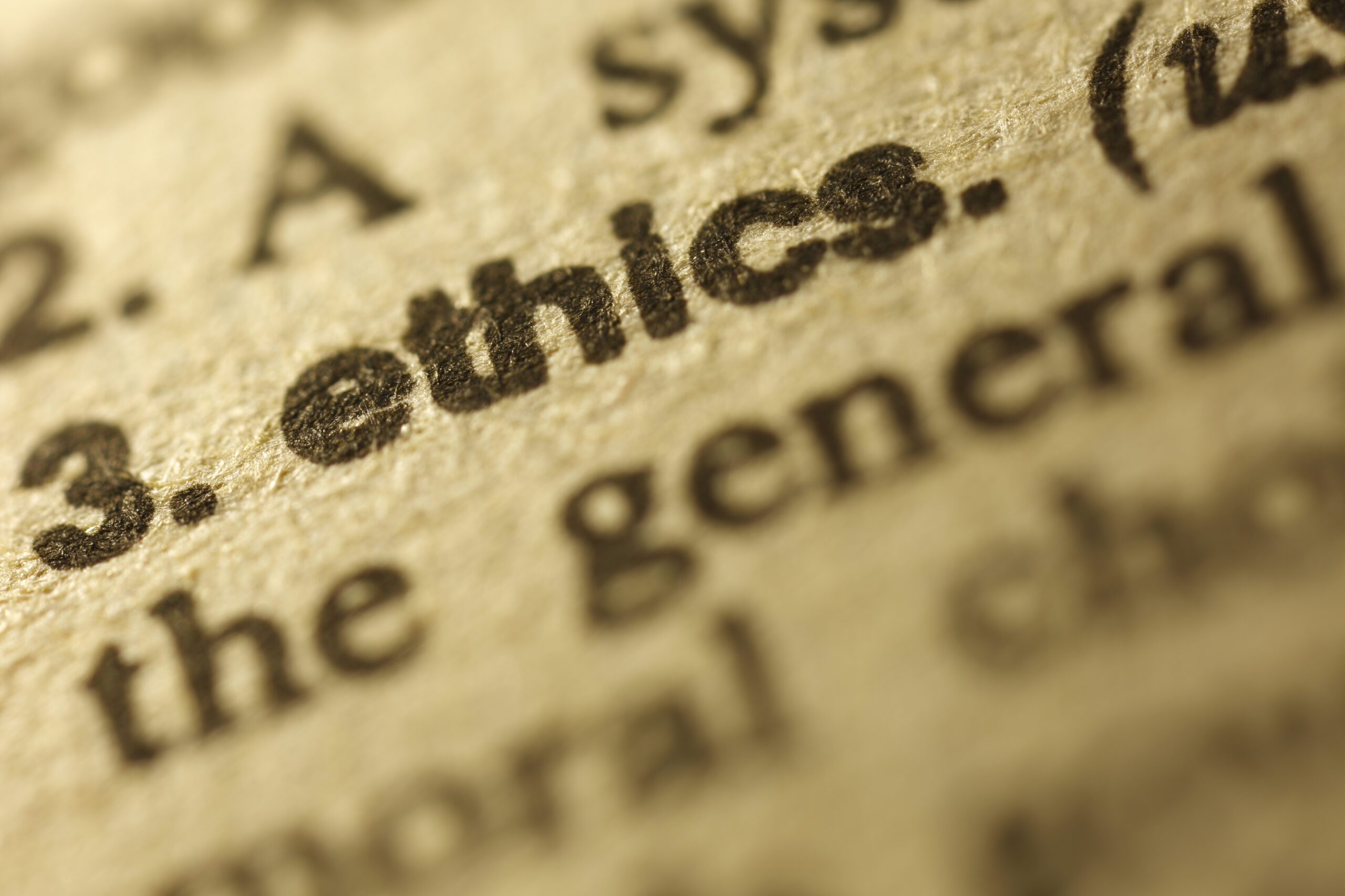
Ed. note: Please welcome Renee Knake Jefferson back to the pages of Above the Law. Subscribe to her Substack, Legal Ethics Roundup, here.
Welcome to what captivates, haunts, inspires, and surprises me every week in the world of legal ethics.
Happy First Monday!
On the first Monday of each month, you get a longer version of the Roundup with recent headlines plus reading recommendations, job postings, events, and other features.
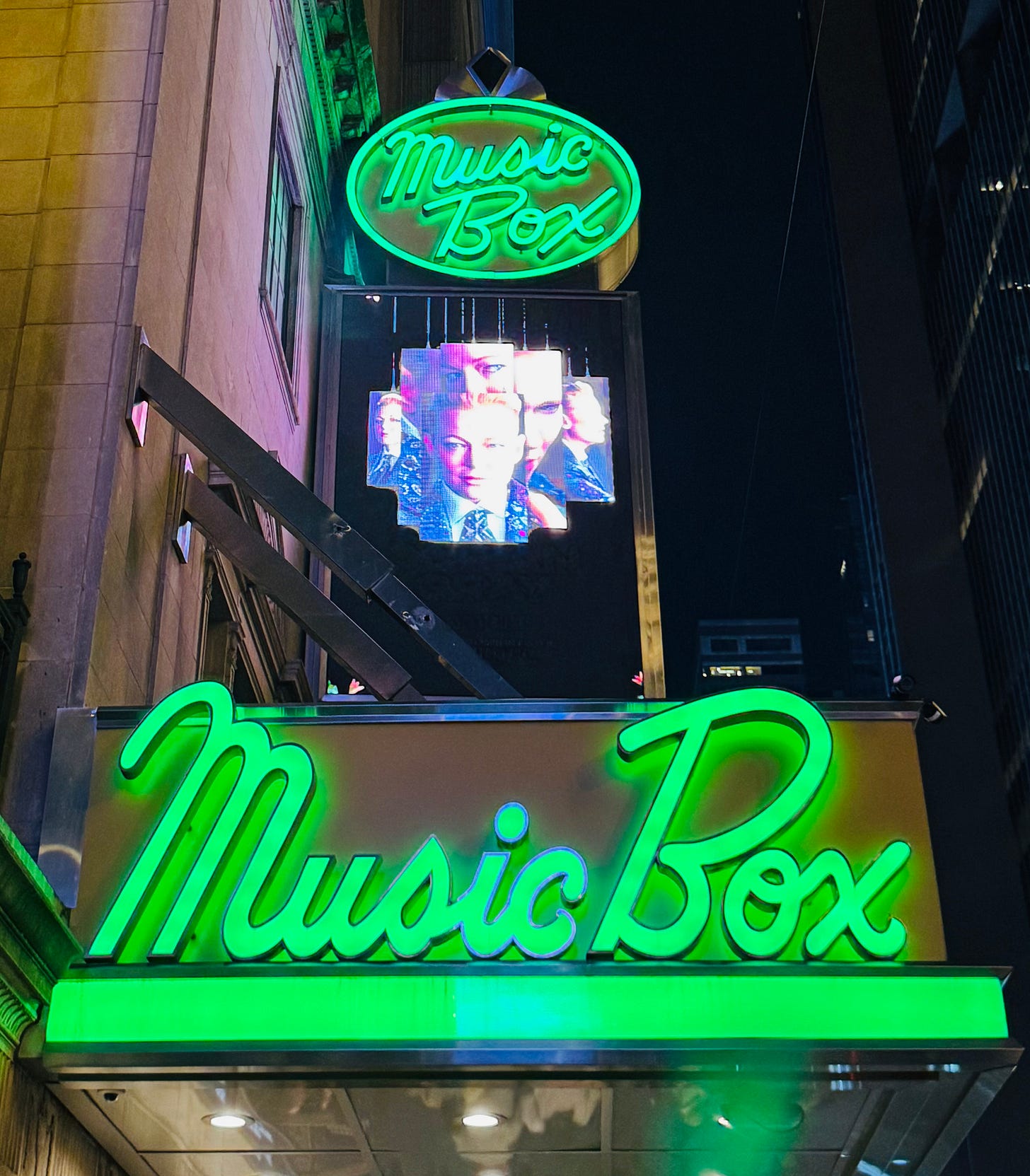
I’ve just returned from a whirlwind trip to NYC and DC, where I spoke at the American Bar Association 50th National Conference on Professional Responsibility. (More on that below under the “Deep Dive” section.) While in NYC I caught two plays, both choices inspired after I heard interviews with the actors on NPR’s Fresh Air. Sarah Snook of Succession fame plays twenty-six different characters in two hours with no intermission in The Picture of Dorian Gray. It’s the most stunning performance I’ve ever witnessed in theater, and a must-see if you’re in NYC in June. This interview of Snook by Ann Marie Baldonado about how she prepared for the role is terrific too. George Clooney plays Edward R. Murrow in Good Night and Good Luck, also an amazing performance. This is one everyone can see even if you can’t make it to NYC. The play will be broadcast LIVE on CNN on June 7 (for more on that, see here). And his interview about the play with Terry Gross also is worth a listen.
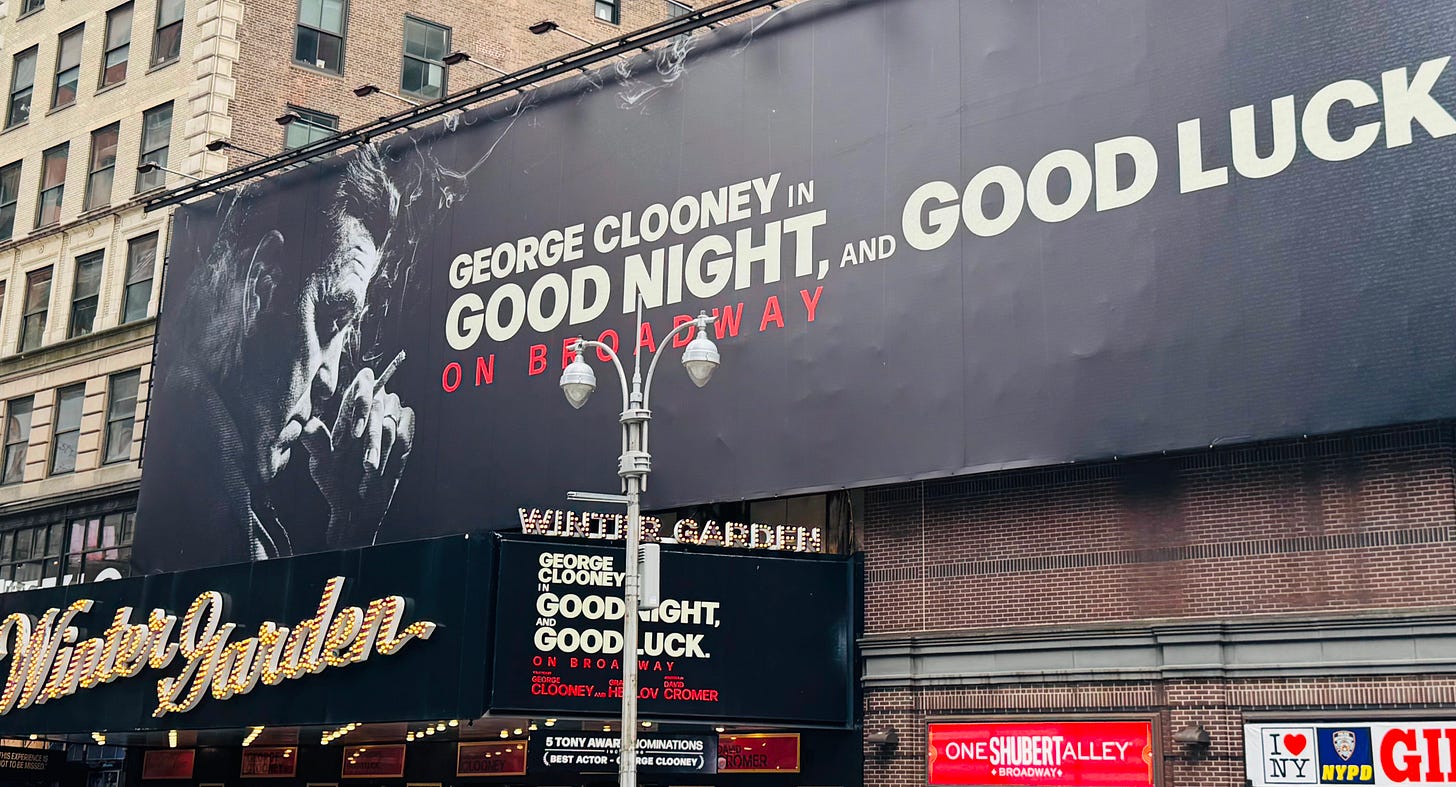
That’s it for theater reviews. Now let’s turn to the headlines.
Highlights from Last Week – Top Ten Headlines
#1 “Biglaw Firms 3, Trump 0.” From the Wall Street Journal: “President Trump dismisses court rulings against him as judicial overreach, and sometimes he’s right. But what does it say when multiple judges across the political spectrum rule against him on similar sweeping grounds? That’s happening to his punitive executive orders against liberal law firms, and he’s batting zero for three. The latest forceful rebuke came Tuesday from federal Judge Richard Leon, a conservative nominated by George W. Bush. His 73-page opinion is a scorcher concluding that Mr. Trump’s EO against the WilmerHale law firm ‘must be struck down in its entirety as unconstitutional. Indeed, to rule otherwise would be unfaithful to the judgment and vision of the Founding Fathers!’ … The Trump EOs are an abuse of executive power that isn’t justified under any fair reading of the Constitution. The rulings against the EOs are powerful enough, and the Administration’s arguments in defense are flimsy enough, that we suspect the firms will prevail again if the White House appeals.” Read more here (gift link). Read the opinion here.
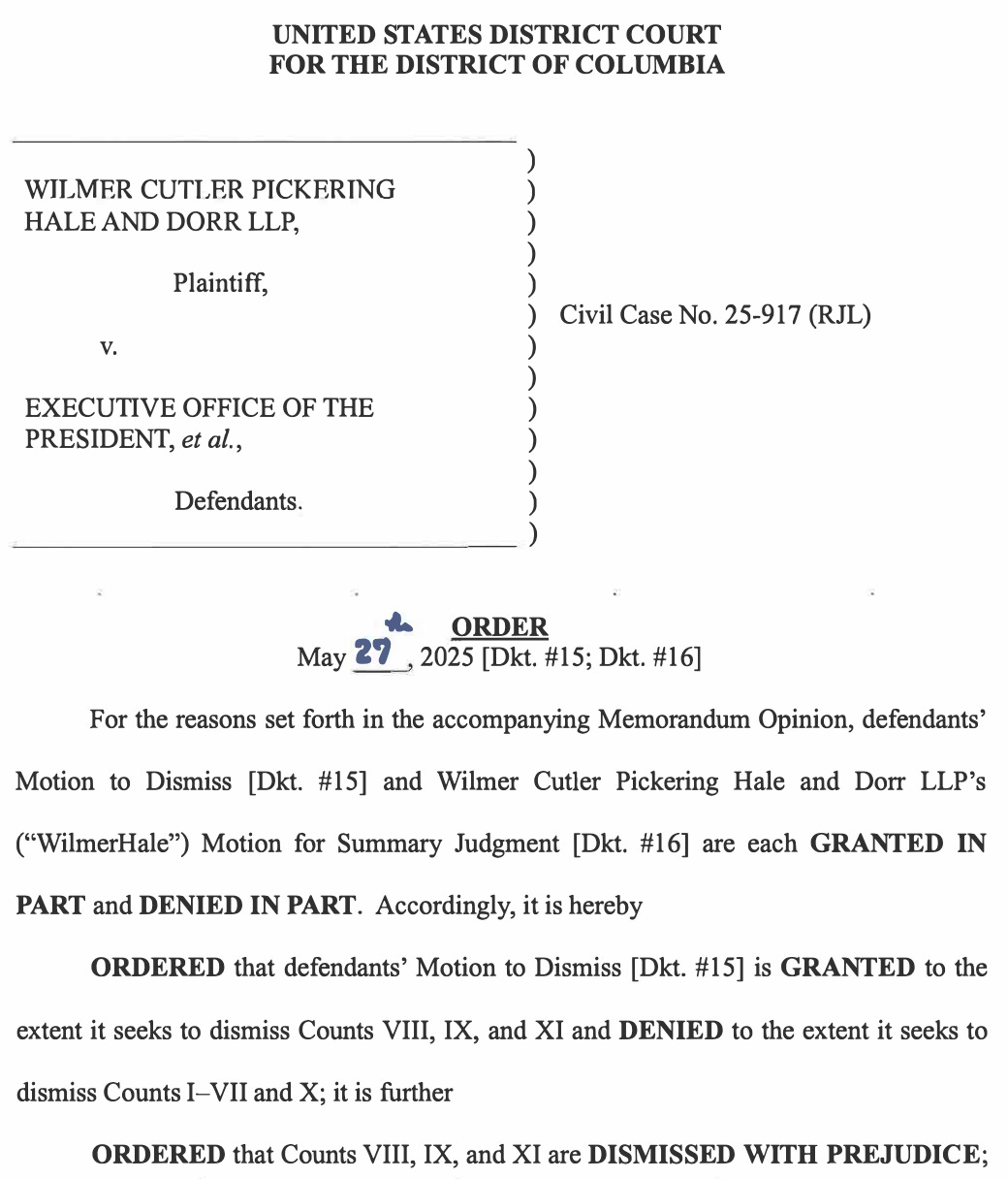
#2 ABA and Federalist Society Both Apparently Dismissed from Advising on Future Judicial Nominations. Two headlines for #2. First, from Reuters: “The U.S. Department of Justice on Thursday limited the American Bar Association’s decades-old role in rating candidates for life-tenured positions in the federal judiciary, curtailing its ability to vet new nominations by Republican President Donald Trump. U.S. Attorney General Pam Bondi in a letter to ABA President William Bray said that for decades the nation’s largest voluntary association of lawyers had enjoyed special access to judicial nominees.” Read more here. (This isn’t the first time the ABA’s role in vetting nominees has been curtailed. For example, President Ronald Reagan did not rely on the ABA when selecting Sandra Day O’Connor as the nation’s first female Supreme Court justice, a history recounted in my book Shortlisted: Women in the Shadows of the Supreme Court.) Second, from Axios: “President Trump has gone scorched earth on the architect of his own judicial legacy, disavowing Leonard Leo, the Federalist Society and any judge who stands in the way of the MAGA agenda.” Read more here.
#3 “Wisconsin Judge Claims ‘Absolute Immunity,’ Calls DOJ Indictment an ‘Ugly Innovation.’” From Fox News: “The legal team representing a Wisconsin judge accused of helping a man evade immigration authorities recently expanded their motion to dismiss the case. Judge Hannah Dugan’s attorneys say that she is entitled to judicial immunity for her official acts and that the federal government overstepped its authority by arresting and charging her. Additionally, the legal team asserts in its memo that the charges violate the Constitution’s Tenth Amendment and the principle of separation of powers.” Read more here.
#4 “Chief Judge Questions Judicial Boycotts in Tossing Complaint.” From Bloomberg Law: “A federal appeals court chief judge dismissed a misconduct complaint against a district judge who will no longer hire law clerks from Columbia University, but said ‘widespread judicial boycotting’ could lead to lower public confidence in the courts. US District Judge Daniel Traynor of the District of North Dakota is among the 13 federal judges who signed a letter last year, promising not to hire law clerks from Columbia over its handling of student protests on the Israel-Hamas war. A newly released April 8 order from Chief Judge Steven M. Colloton of the US Court of Appeals for the Eighth Circuit dismissing the complaint didn’t name Traynor, but he’s the only trial judge from that circuit who is part of the boycott.” Read more here.
#5 “Illinois Lawmakers’ Latest Perk – Continuing Education Credits for Going to Work.” From the Chicago Tribune: “State legislators who are also lawyers in Illinois are getting a new perk, courtesy of the state Supreme Court. They just need to show up for work in the Illinois General Assembly and they’ll be able to collect credit toward satisfying continuing education classes required to keep their law licenses in good standing. … Steven Lubet, a professor emeritus at Northwestern University’s law school and an expert on legal ethics, called the credit for lawmakers ‘remarkable.’ ‘It is especially weird because full-time law teachers do not obtain credit for teaching law school courses, presumably on the theory that MCLE credit requires more than just doing your job,’ Lubet wrote in an email. ‘I don’t see why that same principle wouldn’t apply to legislators.’” Read more here.
#6 “The 10 Texas Law Schools Face Uncertainty as the State Seeks Comments on the Continued Viability of ABA Accreditation.” From the University of Houston: “What if the 10 Texas law schools no longer were accredited with the American Bar Association’s (ABA) seal of approval? That ‘what if’ scenario has become a much-discussed possibility since April 4, 2025, when the Texas Supreme Court issued an order inviting comment on the future role of the ABA in accrediting the state’s 10 law schools. The Court is weighing whether to reduce or eliminate reliance on the national accreditor — a move that could significantly change how legal education and licensure work in Texas with ripples beyond its borders. Such a change raises important questions about the future of legal education, the availability of federal financial aid, and portability of Texas bar licensure potentially affecting the careers of thousands of current and future law students.” Read more here.
#7 “Trump Officials Intensify Attacks on Judges as Court Losses Mount.” From the New York Times: “Even by the judge-bashing standards of the Trump administration, the White House’s sharp reactions this week to court decisions curtailing its agenda appeared to intensify a strategic effort to undermine confidence in the judiciary. ‘Trump’s attack on the judges is an attempt to undo the separation of powers,’ Ty Cobb, a lawyer who defended Mr. Trump in a special counsel investigation in his first term, said in an interview. ‘It’s an attempt to take what is three coequal branches and make it one dominant branch.’” Read more here (gift link).
#8 “The Wars on Universities & Law Schools.” From Daniel B. Rodriguez (Northwestern) on his Substack of the same name: “An intriguing post here on potential threats by Trump administration actions against law schools. … As to what risks law schools face by federal actions that take away benefits (entitled or merely a privilege, as ultimately courts will need to sort out), let me add one important additional risk and that is employment by federal and even state governments. Many law graduates seek employment by federal agencies and key cabinet departments (e.g., the Dep’t of Justice); some as well look for opportunities in the U.S. military. And a critical mass aspire to clerkships with one or another federal judge. All of these opportunities, even judicial clerkships are in great peril if the presidential administration makes it clear that graduates from certain schools are not welcome.” Read more here.
#8 Ford Sues Lawyers for Billing 29-Hour, Even 57.5-Hour Days. From the Detroit Free Press: “Ford said it found evidence that these California-based lawyers falsely submitted time sheets to the courts that recorded well over 24 hours in a single day or, in one case, a lawyer who claimed to have attended two different trials in two different courtrooms that were hundreds of miles apart on a single day, totaling 29 hours of billing in that 24-hour day. … The Dearborn-based automaker filed a complaint in Los Angeles federal court against nine defendants, all lawyers, on May 21, accusing them of violations of the Racketeering Influenced and Corrupt Organizations Act (RICO). Ford said it lost at least $100 million from the scheme and is seeking some $300 million in damages.” Read more here.
#9 “Calif. Justices Propose Tweaking Rules For Bar Examiners.” From Law360: “The California Supreme Court has proposed changes to the administration of the state’s troubled bar exam, circulating a slate of amendments designed to clarify the role of the Committee of Bar Examiners, including spelling out its duty to review and approve all questions used in the exam. An accompanying announcement the court made on Wednesday pointed to some key proposed changes, which include requiring the 10-member Committee of Bar Examiners to review all exam questions, institute standards to be used for selecting subject-matter experts to review new questions, and develop accreditation standards for vetting third-party vendors’ ability to administer or proctor the exam.” Read more here.
#10 “Celebrating the Michael Franck Professional Responsibility Award.” From the Legal Ethics Roundup: “Myles Lynk (Arizona State) receives the prestigious ABA Michael Franck Professional Responsibility Award for his years of distinguished service.” Read more here (in case you missed the Bonus Post last week).
Deep Dive
In this month’s Deep Dive, I’m bringing you insights from the ABA 50th National Conference on Professional Responsibility, where I spoke last week about the rise of nonprofits devoted to lawyer ethics accountability (for more on that see here). I also had the opportunity to sit in on a thoughtful discussion among Paula Frederick (State Bar of Georgia), Wendy Muchman (Northwestern), Ronald Minkoff (Frankfurt Kurnit Klein & Seitz, PC), and Lucian T. Pera (Adams and Reese LLP) in a panel titled “Is It Time to Reform America’s Lawyer Regulatory System?” The short answer from the panelists is yes.
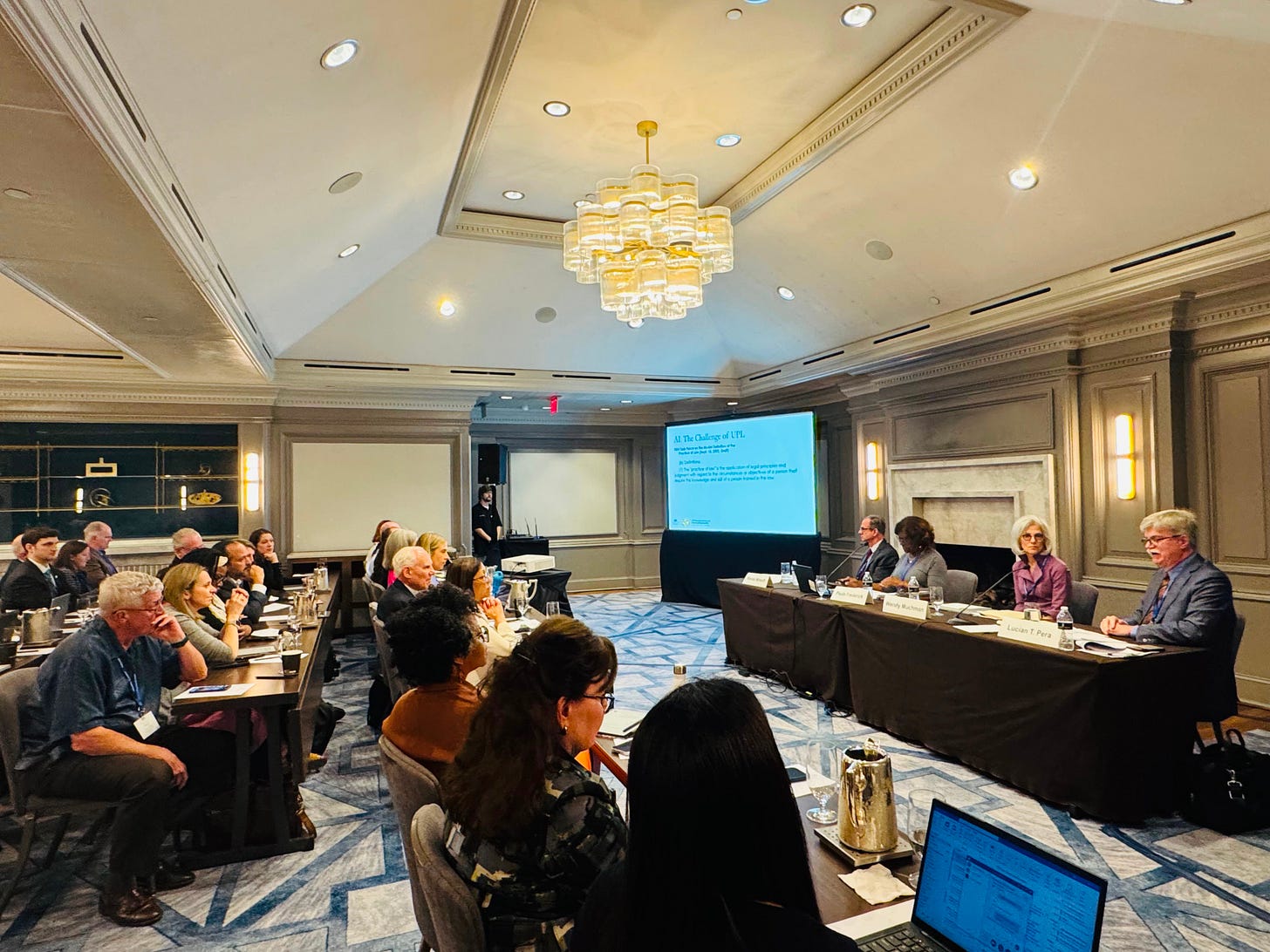
While there’s not a recording of the session to share, you can read their explanation for why the answer is “yes” in an article published by Bloomberg Law. Here’s an excerpt:
It’s time for the American Bar Association to launch a fresh, high-level effort to renew the US lawyer discipline system for the 21st century. There has been a steady drumbeat of discussion recently about US lawyer regulation. Much of the debate has surrounded questions of nonlawyer ownership of law firms, fee-sharing with nonlawyers, and licensing of legal para-professionals. These are important discussions, but that’s not what we propose. Instead, as lawyers who have practiced and worked in the lawyer regulatory system for many years—more than 200 years collectively—we believe it is time for the ABA, the traditional convener and leader on lawyer regulation, to launch a once-in-a-generation review of the mechanics, structure, and reach of lawyer regulation. It’s time to revisit the infrastructure of lawyer regulation, rather than the substance of ethics rules. Some of us hold elected or appointed positions in the ABA. None of us speak in those official positions, for the groups we represent or work with, or for the ABA. We speak only for ourselves in our personal capacities. Still, we believe many in lawyer ethics and regulation share our view. Like roads and bridges, the rules, procedures, enforcement tools, as well as the jurisdictional boundaries of lawyer regulation, need periodic maintenance. We believe the infrastructure of American lawyer discipline is overdue for an update.
Read more here.
Recommended Reading
Recommendation #1: “Law Firm Executive Orders and the Courts” by David McGowan (San Diego). From the abstract:
Recent executive orders targeting law firms indirectly target courts. Because the rule of law depends on adjudication, which in turn depends on a bar willing to bring and defend claims, the orders place the rule of law at risk. The administration’s caustic attacks on judges, both in general and in connection with the orders, confirms this point. The orders effectively admit that they retaliate for activity protected by the First Amendment. The administration’s conduct relating to the orders shows that pain is the point of the orders and that the administration is unconcerned with their legality. Some of the firms targeted did important work defending the integrity of the 2020 election against attacks that proved to be unfounded. The example of that election highlights the need for firms to be prepared to defend against such attacks. It also highlights the risk that firms submitting to the administration’s demands will be unwilling to defend such cases in the future.
Download from SSRN here.
Recommendation #2: “Attorney Responsibility for Climate Change?” by Victor Flatt (Case Western). From the abstract:
It may be true that all humans contribute to climate change, but not all contribute equally. Some “super emitters” have some agency in how, whether, and how much GHGs will be emitted. These super emitters in turn depend on a myriad of supporting services that facilitate the infrastructure from which these emissions come. Accountants, financiers, Investors, and lawyers provide the most critical of these services. Without them, the super emitters could not continue their emitting. What then is the responsibility of attorneys for these emissions?
Download from SSRN here.
Recommendation #3: “Pro Bono Publico Versus Pro Bono Presidential” by S.I. Strong (Emory). From the abstract:
In March and April 2025, the Trump administration issued a series of executive orders directed at various law firms that had represented clients or undertaken actions with which the president disagreed. Those executive orders imposed various sanctions capable of destroying the firms financially. The administration also threatened a number of other law firms with similar types of executive orders. While a few law firms chose to challenge the executive orders in court, the majority of firms targeted by the president entered into informal settlement agreements whereby the firms promised to provide between $40 million and $125 million worth of free “pro bono legal services” to causes supported by the president. In return, the president either revoked any sanction-containing executive orders or withheld from issuing such orders. This Essay considers the propriety of these pro bono agreements from several perspectives. First, this Essay considers the voluntary nature of pro bono and examines the propriety of the executive branch coercing private lawyers to accede to particular pro bono obligations. Second, this Essay discusses the nature of pro bono activities as a means of assisting indigent individuals and considers whether presidential efforts to direct how private law firms fulfill their pro bono obligations constitute an improper privatization of the executive branch’s policy goals, particularly given presidential cuts to and curtailment of conventional public means of fulfilling those policy goals. Third, this Essay considers whether and to what extent the executive orders and settlement agreements discussed herein violate hard or soft principles of international law. The Essay concludes with brief suggestions about how to proceed going forward.
Download from SSRN here.
Legal Ethics Trivia
From the Texas Center for Legal Ethics, here’s the question of the month: “Do the ethics rules permit an attorney to join an out-of-state law firm that permits non-attorney partners?” Test yourself at this website where you can read a short hypothetical, select an answer, and see your results. So far, out of 167 responses, 39% have gotten it right. Will you?

Get Hired
Did you miss the 100+ job postings from previous weeks? Find them all here.
- Attorney/Deputy Ethics and Compliance (E&C) Officer, Johns Hopkins — Laurel, Maryland. From the posting: “You will assist the Principal E&C Officer with the investigation of alleged policy violations arising under APL’s Code of Ethics and Conduct. As part of this responsibility, you will analyze inquiries, make determinations of appropriate action for complaints, develop investigative plans, conduct fact-finding and necessary legal research, as well as prepare confidential reports of investigative findings and accompanying correspondence.” Learn more and apply here.
- Attorney, Ethics and Compliance Division, City of New York — NYC. From the posting: “The Ethics & Compliance Division has counseling and ligation adjacent roles and responsibilities. The Divisions counseling role involves advising City Hall, elected officials, and Law Department and other City agency officers and employees on a variety of topics, including legal ethics, conflicts, privileges, federal grants, Medicare compliance, and outside employment. Division attorneys also conduct internal and external trainings in these areas.” Learn more and apply here.
- Conflicts Attorney, Gunderson Dettmer — California/Remote. From the posting: “Reviews client, related party and adverse party data for new matters to determine whether these proposed engagements involve conflicts of interest. This entails identifying possible conflicts from conflict reports containing that data, contacting the attorneys responsible for relevant matters, and drafting and seeking conflict waivers from select clients to resolve those possible conflicts.” Learn more and apply here.
- Director of Democracy Reform, Citizens for Responsibility and Ethics in Washington — DC. From the posting: “The Director of Democracy Reform will lead an effort to envision how we rebuild American democracy and will serve as a strategic thought partner to the Vice President for Policy, Policy Director, President, and Executive Director. This position will report to the Vice President for Policy.” Learn more and apply here.
- Conflicts Attorney, Holland & Knight — Numerous Offices. From the posting: “With the appropriate oversight from the firm’s Professional Standards Partner, the Conflicts Attorney will assist with managing the conflict resolution process related to new business intake, while protecting the firm and its clients from adversity and risk. Periodic in-person presence is required for annual or bi-annual weekend team building events. Attendance at in-person quarterly meetings may also be required, depending on a person’s location. This position can be based within a reasonable commuting distance of any of our U.S. offices.” Learn more and apply here.
- Risk and Compliance Attorney, Freshfields — Hybrid. From the posting: “The Risk & Compliance Lawyer plays a key role as a member of the firm’s Legal Department, which manages the firm’s risk exposure and provides advice to the firm on a range of legal and compliance issues relating to business acceptance (including conflicts of interest, confidentiality, client due diligence, sanctions issues, reputational and commercial risk) as well as other issues, such as contracting, commercial risks, client engagement terms, local ethical and regulatory issues, and firm policies and practice.” Learn more and apply here.
- Risk and Compliance Counsel – Training & Special Projects, Orrick, Herrington & Sutcliffe LLP — Remote. From the posting: “The Risk & Compliance Counsel – Training & Special Projects will support the Director in the administration of a department that delivers prompt and accurate evaluation and resolution of potential conflicts of interest, new business intake, and lateral attorney conflicts clearance and onboarding. You will collaborate with key Firm departments and members of Firm leadership to execute on the Firm’s new business and conflicts strategy.” Learn more and apply here.
Upcoming Ethics Events & Other Announcements
Did you miss an announcement from previous weeks? Find them all here.
2025
- June 5, 2-3PM. Paths Forward: A Phased Approach to Regulating AI in Consumer-Facing Legal Tools. Register here for this free webinar hosted by the University of Denver’s Institute for the Advancement of the American Legal System.
- July 21. Call for Papers Deadline: The Role of AI in Legal Education – Preparing the Next Generation of Lawyers at Westminster Law School, London. This September 11 event will bring together academics, legal professionals, students, and industry stakeholders to examine how AI is reshaping law degrees, particularly in areas such as curriculum design, assessment, teaching methods, and graduate employability. Keynote Speakers include Lisa Webley (University of Birmingham), Dan Hunter (King’s College London), and Luke Mason (University of Westminster). Submit here (funding support for early career academics available).
- August 1. Call for Papers Deadline: Association of American Law Schools New Voices Call for Papers Deadline. The AALS Section on Professional Responsibility invites submissions for its New Voices panel at the Annual Meeting, January 2026 in New Orleans, LA. Submissions are invited from junior faculty (those who are pre-tenure or otherwise with five or fewer years of experience), along with others who are new to writing in the field of Professional Responsibility. Those submitting work must be full-time faculty members (including full-time VAPs or fellows) at AALS member law schools. Work that has already been published (or will be published prior to the conference) is ineligible for consideration. Interested faculty should submit their work for consideration to Sarah Cravens scravens@uark.edu no later than 5:00pm Central Time on Friday, August 1, 2025, with “PR New Voices Submission – 2026 Annual Meeting” in the subject line of the email.
- August 7-9. Association of Professional Responsibility Lawyers Annual Meeting in Toronto. Learn more here.
- August 12, 2-3PM Eastern. Measuring What Matters: Evaluating the Impact of InnovationsA Webinar Series on Judicial Innovation and Leadership. Building on the momentum of the Advancing Innovation National Summit, IAALS and the Berkeley Judicial Institute are thrilled to present this dynamic webinar series designed to equip judges with the practical tools and insights needed to drive meaningful innovation in the courts. The series will go beyond theory and dive deep into strategies that will empower judges to navigate change, build trust, and foster a more accessible justice system for all. This series is open to all judges seeking to become catalysts for positive change in the legal system. Learn more and register here.
- 2026
- December 2-4. International Legal Ethics Conference at the University of Houston. Learn more here.
Keep in Touch
- News tips? Announcements? Events? A job to post? Reading recommendations? Email legalethics@substack.com – but be sure to subscribe first, otherwise the email won’t be delivered.
Renee Knake Jefferson holds the endowed Doherty Chair in Legal Ethics and is a Professor of Law at the University of Houston. Check out more of her writing at the Legal Ethics Roundup. Find her on X (formerly Twitter) at @reneeknake or Bluesky at legalethics.bsky.social.
The post Legal Ethics Roundup: Ford Sues Lawyer Billing 57-Hour Day, ‘Biglaw 3, Trump 0,’ ABA & Fed Soc Out on Judges & More appeared first on Above the Law.






















